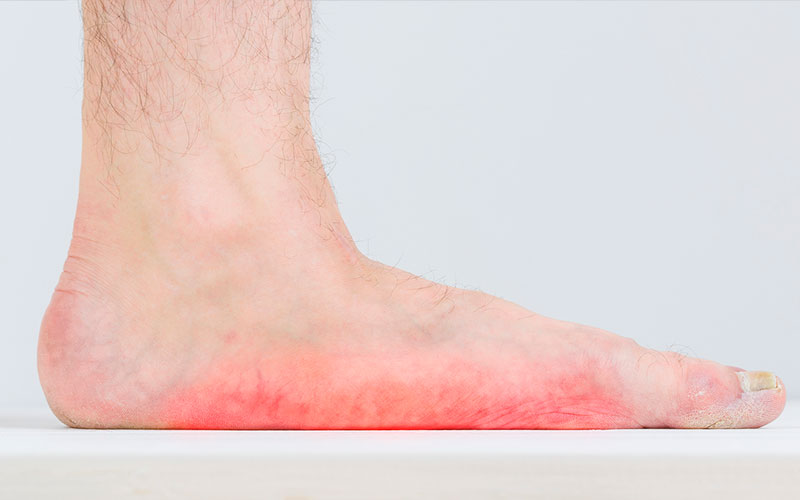Flat Feet and High Arches
Both high arches (cavus foot) and flat feet can cause problems as, in both situations, the foot is not neutral, which causes an abnormal load in the foot and lower limb.

This abnormal load is often a source of pain and inflammation. In general, high arched feet are too rigid and have limited shock absorption ability as the arch doesn’t flatten on impact while flat feet have the opposite problem as the foot doesn’t have enough support.
What are the causes?
Flat Foot
In adolescents, flat feet are often caused by loose capsular ligaments, which is related to muscular weakness. In older adults, after the age of 40, flat feet can worsen, which is usually caused by a dysfunction of the posterior tibial tendon (the tendon responsible for raising the arch of the foot).
Common causes include:
- A genetic predisposition
- Weak arches
- Injuries to the foot or ankle
- Arthritis
- Muscle or nervous system diseases
- Tarsal coalition
High Arch
High arches are usually due to genetics but can be caused by paralysis of the leg muscles, or disorders of the central nervous system or spinal cord.
What are the symptoms?
Flat Foot
With flat arches, feet may roll inwards when standing or walking (called overpronation), and they may also cause the feet to point outward. Your risk of developing flat feet increases if you are older, have rheumatoid arthritis, diabetes, are obese, or have injured your foot or ankle.
Pain is the most common symptom of flat feet due to strained muscles and ligaments. Flat feet can also put stress on your knees and hips, especially if your ankles turn inward, and one or both of your feet might also feel stiff. Flat feet can also result in an uneven distribution of weight, causing shoes to wear unevenly.
Because they affect the body’s alignment, flat feet can cause pain in areas such as:
- Ankles
- Calves
- Knees
- Hips
- Lower back
Flat feet can lead to bunions and can worsen conditions such as arthritis, hammertoes, tendonitis, plantar fasciitis, posterior tibial tendonitis, and shin splints.
High Arch
The arch of a cavus foot appears high even when standing and can cause foot pain because they put extra stress on your toes, redistributing weight onto the ball of your foot, causing issues such as:
- Hammertoes and claw toes
- Arch stiffness and inflexibility
- Calf tightness
- Corns and calluses
- Under pronation or supination which leads to kneed, Achilles and ITB pain as well as plantar fasciitis
- Pain when standing or walking
- Ankle sprains as the heel tilts inwards
When should you see a doctor?
Flat Feet
If you suspect you may have flat feet and have symptoms such as pain in the feet, ankles or calves, flat feet that have recently developed or foot rigidity and stiffness, you should consult a doctor. Flat feet can be diagnosed through observation of the individual as the stand and walk, and by examining the feet. A specialist will also take a full medical history, and in some cases, x-rays may be necessary.
Treatment is usually non-surgical, with options including well-fitted shoes, custom orthotics, and short-term braces to relieve pressure.
High Arch
To diagnose cavus foot, your foot doctor will review your family history, examine your foot looking for hammertoes, claw toes, a high arch, and calluses. They will then test your feet for muscle strength as well as looking at your gait and the pattern of wear on your shoes. X-rays may be necessary to assess your condition and, if a neurological condition is suspected, they will refer you to a neurologist.
Non-surgical treatments for high arches include custom orthotics for stability and cushioning, shoe modifications, and bracing to keep the foot and ankle stable. If non-surgical treatment is not able to relieve pain or improve stability, surgical intervention may be needed.
Get in touch
As a multi-medical practice, our specialist team of doctors can help if you have complications due to flat feet or high arches. To schedule an appointment, please give us a call on 847-885-9525 or request one through the website.